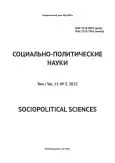Planning as a Theoretical, Legal and Political Category: Towards the Problem Statement
- Authors: Zubov V.V.1,2
-
Affiliations:
- Financial University under the Government of the Russian Federation
- Bauman Moscow State Technical University
- Issue: Vol 15, No 3 (2025)
- Pages: 17-26
- Section: History and Theory of Politics
- URL: https://bakhtiniada.ru/2223-0092/article/view/313317
- DOI: https://doi.org/10.33693/2223-0092-2025-15-3-17-26
- EDN: https://elibrary.ru/RDHSZP
- ID: 313317
Cite item
Abstract
This article is devoted to understanding the phenomenon of planning through the political and legal instruments and conceptual framework of political science and state and legal theory. Using definitional analysis, system-structural method, formal-legal approach, literal, complex and contextual interpretation of legal norms, historical retrospective, the author defines possible planning vectors based on historical material and existing theoretical-legal and political science approaches, makes a categorical distinction between planning and control and monitoring, characterizes the stages of planning from the process side, designates the relationship between planning as part of social reality and strategic planning as a legal institution, establishes the main current regulations in the field of strategic planning. It is noted that planning in the general theoretical dimension, as part of social reality and a prerequisite for the development of normative legal foundations for state planning, appears as a mental picture of a controlled and managed future. In its turn, strategic planning, as follows from the relevant legislation, is considered as an activity on goal-setting, forecasting and programming of such areas of application of state efforts as the socio-economic development of the country as a whole, its subjects and municipalities, state administration, and national security. It is stated that the object of strategic planning is the entire range of state functions, from domestic to foreign policy. In conclusion, it is noted that the conducted comprehensive study of planning made it possible to identify a categorical divergence between planning, on the one hand, and strategic planning, on the other hand. The author concludes that the established discrepancy is determined by the difference in interpretations of planning (strategic planning) in the socio-philosophical and legal discourses. If in the logical and philosophical sense strategic planning is one of the varieties of planning in general, then in the domestic normative legal space planning appears as a part of strategic planning, given that the latter forms an inter-sectoral legal institution.
Full Text
##article.viewOnOriginalSite##About the authors
Vadim V. Zubov
Financial University under the Government of the Russian Federation; Bauman Moscow State Technical University
Author for correspondence.
Email: zubov305@yandex.ru
ORCID iD: 0000-0001-6446-3221
SPIN-code: 1747-1789
Scopus Author ID: 57211342801
Cand. Sci. (Hist.), Leading Researcher; Associate Professor at the Department of Political Science of the Faculty of Social Sciences and Mass Communications; Associate Professor at the Department of Philosophy of the Faculty of Social and Humanitarian Sciences
Russian Federation, Moscow; MoscowReferences
- Amkuab K.G. Features of the strategic planning mechanism. Education and Law. 2023. No. 5. Pp. 103–106. (In Rus.) doi: 10.24412/2076-1503-2023-5-103-106.
- Gaman-Golutvina O.V. Political Comparative Studies. Moscow: Aspect Press, 2020. 784 p. EDN: KRPAQT.
- Marx K., Engels F. Principles of Communism. Manifesto of the Communist Party. Moscow: ITRK Publishing House, 2007. 68 p.
- Martyshin O.I. History of political and legal doctrines. Moscow: Prospect, 2016. 800 p. EDN: WGBCXZ.
- More T. Utopia. Moscow: Nauka, 1978. 416 p.
- Mukhaev R.T. Political sciences. Moscow: Prospect, 2015. 640 p. EDN: UOPXSJ.
- Novikov O.G., Mamaeva Yu.A. Political management. Moscow: KnoRus, 2023. 236 p. EDN: VCLRQC.
- Filippov A.R. Political ideology as a type of manipulation. Power. 2024. No. 3. Pp. 133–139. (In Rus.) doi: 10.24412/2071-5358-2024-3-133-139.
- Filippov A.R., Novikov O.G. Theoretical approaches to the study of social consensus. Sociopolitical Sciences. 2023. Vol. 13. No. 5. Pp. 13–28. (In Rus.) doi: 10.33693/2223-0092-2023-13-5-13-28. EDN: XXUJSY.
- Heidegger M. Being and time. St. Petersburg: Nauka, 2006. 452 p.
- Kharkova O.M. State strategic planning. Natural Sciences and Humanities Research. 2023. No. 3 (47). Pp. 244–248. (In Rus.) EDN: UVJMQZ.
- Lijphart A. Democracy in plural societies. A comparative exploration. New Haven; London: Yale University Press, 1977. 248 p.
Supplementary files








